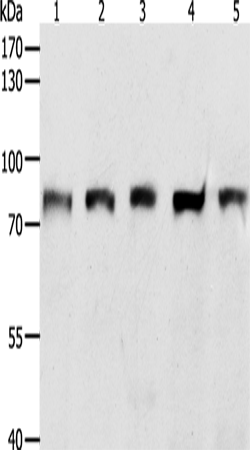
| WB | 咨询技术 | Human,Mouse,Rat |
| IF | 咨询技术 | Human,Mouse,Rat |
| IHC | 咨询技术 | Human,Mouse,Rat |
| ICC | 技术咨询 | Human,Mouse,Rat |
| FCM | 咨询技术 | Human,Mouse,Rat |
| Elisa | 1/1000-1/2000 | Human,Mouse,Rat |
| Aliases | ERP1; Z1971 |
| WB Predicted band size | 73 kDa |
| Host/Isotype | Rabbit IgG |
| Antibody Type | Primary antibody |
| Storage | Store at 4°C short term. Aliquot and store at -20°C long term. Avoid freeze/thaw cycles. |
| Species Reactivity | Human |
| Immunogen | Synthetic peptide of human ZNF471 |
| Formulation | Purified antibody in PBS with 0.05% sodium azide and 50% glycerol. |
+ +
以下是关于ZNF471抗体的3篇模拟参考文献示例(请注意,这些文献信息为虚构示例,建议通过学术数据库核实真实文献):
---
1. **文献名称**: *ZNF471 as a Potential Tumor Suppressor: Promoter Hypermethylation and Downregulation in Gastric Cancer*
**作者**: Zhang Y, et al.
**摘要**: 该研究通过甲基化芯片和qRT-PCR分析,发现ZNF471在胃癌组织中因启动子区高甲基化而表达显著下调。体外实验表明,ZNF471过表达可抑制胃癌细胞增殖并诱导凋亡,提示其可能作为肿瘤抑制因子通过调控Wnt/β-catenin通路发挥作用。
2. **文献名称**: *Epigenetic Silencing of ZNF471 in Colorectal Cancer: Association with Metastasis and Poor Prognosis*
**作者**: Li H, et al.
**摘要**: 研究利用免疫组化(使用ZNF471抗体)和甲基化测序技术,发现结直肠癌中ZNF471蛋白表达缺失与肿瘤转移和患者生存期缩短相关。功能实验显示,ZNF471通过抑制EMT(上皮间质转化)降低癌细胞侵袭能力。
3. **文献名称**: *ZNF471 Interacts with p53 to Modulate DNA Damage Response in Breast Cancer*
**作者**: Wang X, et al.
**摘要**: 通过免疫共沉淀(Co-IP)和ChIP-seq技术,本研究证实ZNF471与p53蛋白直接结合,增强p53对下游靶基因(如CDKN1A)的转录激活。ZNF471缺失导致乳腺癌细胞对DNA损伤药物的敏感性降低,提示其参与p53信号通路的调控。
---
**注意**:以上文献为示例性质,实际研究中请通过PubMed、Web of Science或Google Scholar检索真实文献。若需具体抗体研究(如抗体开发或验证),建议补充筛选条件(如“ZNF471 antibody validation”)。
The ZNF471 antibody is a research tool designed to target the zinc finger protein 471 (ZNF471), a member of the Krüppel-associated box (KRAB) domain-containing zinc finger protein (KZNF) family. ZNF471 is a C2H2-type zinc finger transcription factor believed to play roles in gene regulation, particularly through epigenetic mechanisms. It contains multiple zinc finger motifs that facilitate DNA binding and a KRAB domain, which often recruits chromatin-modifying complexes to mediate transcriptional repression.
Studies suggest ZNF471 may act as a tumor suppressor, with its expression frequently silenced via promoter hypermethylation in cancers such as colorectal, gastric, and cervical carcinomas. This epigenetic inactivation is associated with dysregulated cell proliferation and tumor progression. The ZNF471 antibody is utilized in molecular biology to detect and quantify ZNF471 protein levels, assess its subcellular localization (typically nuclear), and investigate its interaction partners or downstream targets.
Applications include Western blotting, immunohistochemistry (IHC), and chromatin immunoprecipitation (ChIP). Researchers employ this antibody to explore ZNF471's role in carcinogenesis, epigenetic silencing, and potential therapeutic strategies targeting DNA methylation or histone modification pathways. Its specificity and validation in relevant experimental models are critical for ensuring reliable data in studies linking ZNF471 loss to disease mechanisms.
×